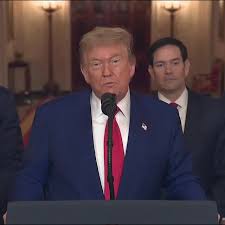President Donald Trump confirmed the United States launched a sweeping air assault on Iran’s nuclear infrastructure, claiming the operation had “completely and totally obliterated” the Islamic Republic’s most critical enrichment sites.
Flanked by top officials including Vice President J.D. Vance and Secretary of State Marco Rubio, Trump declared the strikes a military triumph and issued a stern ultimatum to Tehran: make peace or face worse retaliation.
The strikes, targeting Iran’s Fordow, Natanz, and Isfahan nuclear sites, come amid escalating tensions that have rippled through the Middle East since Israel and Iran began direct military exchanges earlier this month. Trump described Iran as the “bully of the Middle East,” saying the U.S. acted to remove a decades-long nuclear threat.
He praised American military forces for carrying out the operation with “precision, speed, and skill,” framing the attack as a moral and strategic necessity.
Trump’s speech blended nationalistic fervor with familiar grievances, invoking American casualties from past Iranian-linked attacks, including roadside bombs and the 2020 assassination of Iranian General Qassem Soleimani.
“For 40 years, Iran has screamed ‘Death to America’ and killed our people,” Trump said. “That era ends now.” He credited his longstanding alliance with Israeli Prime Minister Benjamin Netanyahu, saying the U.S. and Israel had operated as a “team like perhaps no team ever before.”
The address also included notable religious overtones, with Trump publicly thanking God and calling for divine protection over U.S. troops. He concluded the speech by expressing hope that no further military action would be necessary, but warned Iran that more targets remain. “If peace does not come quickly, we will go after those other targets. Most can be taken out in a matter of minutes,” he said.
International reaction has been swift and divided. At the United Nations, the Security Council convened an emergency session as Iran’s allies condemned the U.S. strikes, calling them a violation of international law. Tehran remains publicly defiant, while the International Atomic Energy Agency (IAEA) has yet to assess the full scope of the damage. Meanwhile, anti-U.S. demonstrations erupted in the Iranian capital, signaling a likely prolongation of the regional conflict.
The Pentagon has announced a follow-up briefing scheduled for early Sunday morning, where Defense Secretary Pete Hegseth and Joint Chiefs Chairman General Dan “Razin” Caine are expected to provide further operational details. As the U.S. administration frames the strike as a decisive blow against Iran’s nuclear ambitions, analysts warn that the path forward remains fraught with risk especially if Tehran chooses retaliation over negotiation.




